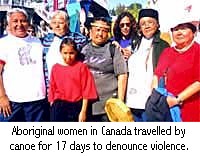"I am a survivor of wife assault. In 1995, I was badly attacked by my ex-husband. Since then I've been wrestling with the problem. I have tried to speak to my community about it, to give women the chance to defend themselves, to face up to it and stop hiding their heads in the sand. It's a radical thing to do because, in our community, everyone is related and no one wants to talk. Even so, I will defend the cause of my sisters, my nieces, my daughter-in-law, and I will stand strong for my daughter."
In New York to march, this Native woman from Canada was speaking of a concern echoed by the 16 Native women who, in September 2000, canoed down the Fraser River in Canada.

The women, from different First Nations, travelled for 17 days, stopping in communities all along the way to talk about problems linked to poverty and violence. On the last leg of the trip, they organized a symposium on the laws in force in Native communities in western Canada. The women questioned the validity of the Restorative Justice Programs under which, instead of going to jail, assailants stay in the community.
Six demands in the Canadian platform insisted that the Canadian government support the human rights of Aboriginal women; that it meet their needs for housing, health, education and justice; that the gender equality analysis be applied in all programs and policies concerning Aboriginal peoples; that legal measures be taken to restore the women's traditional rights to pass on Aboriginal heritage.
Meeting in Panama City on March 8, 2000, the women of the Continental Alliance of Indigenous Women of the Americas presented a common platform in which they demanded "the full recognition of our right to self-determination and independence as well as our territorial, social, economic and political rights." They also demanded to be "consulted and fully involved in drawing up public policy concerning the role of Native peoples and women in so-called development plans."





